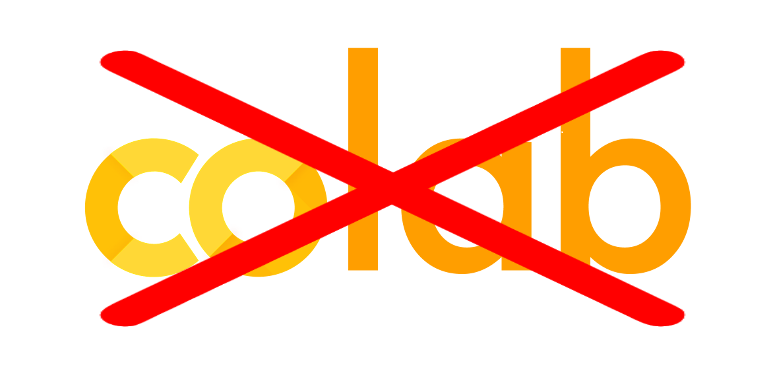Jupyter notebooks have become the go-to standard for exploring machine learning libraries and algorithms. There's now a huge selection of options to choose from when it comes to cloud-hosted notebook services, so we decided to put together a list of the best available options today.
In addition to powerful compute resources that might be difficult to get locally (or which would break the bank if you tried), cloud-hosted Jupyter environments come with features like cloud storage, model training and deployment capabilities, version control, and more. By taking care of all of the hardware and backend configuration, cloud-hosted environments also enable users to focus on their work, without any messy installation, configuration, or hardware purchases.
In recent years, Google Colab has become a popular choice for cloud-backed notebooks. With free GPUs and storage linked to Google Drive, many users in the ML and data science communities find it a natural extension of their Google-centric web existence.
That then begs the question:
Why Shouldn’t I Use Google Colab?
Despite being a popular choice, Colab faces several issues that are deal breakers for many users. Just a few of the drawbacks to Google Colab include:
- Service interruptions
- Slow storage
- Non-configured environments
- Feature-poor
Perhaps the biggest complaint of Colab users is that instances can be shut down (“preempted”) in the middle of a session, and disconnect if you're not actively connected to your notebook. This means that you can lose your work and any training progress – also if you happen to close your tab, or log out by accident. Imagine waiting hours for your model to train, just to come back and see that your instance was shut down; or imagine having to keep your laptop open for 12 hours, afraid that it will go into sleep mode and disconnect you. Other providers, on the other hand, will guarantee the entire session and allow you to pick up where you left off, even if you're not connected the entire time.
Another disadvantage to Colab is its extremely slow storage. When it needs to ingest large quantities of data, Colab will start to crawl. Users report Colab repeatedly timing out if they have too many files in a directory, or failing to read files with obscure and nondescript errors. Unfortunately, dealing with big datasets is a pretty standard part of most ML pipelines, thus making Colab's slow storage reason enough for many users to search for an alternative Jupyter host.
Although Colab might meet the needs of some hobbyists, in contrast to other providers, Colab doesn’t provide many additional features for a comprehensive data science/ML workflow. Colab features are essentially limited to Python support and the ability to share notebooks on Google Drive, which are both quite standard. For instance, other cloud-hosted notebook providers will support version control and easy integration with a full MLOps pipeline.
Google Colab Alternatives
When choosing a hosted Jupyter notebook service, you might take into account features like:
- Uninterrupted service
- Persistent environments
- Storage
- Additional features
Many other hosted Jupyter environments will outperform Google Colab on one or all of these points. A few are listed here.
1. Paperspace Gradient

Gradient is an end-to-end MLOps platform that includes a free hosted Jupyter notebook service, with many options for pre-configured environments and free GPUs and CPUs.
Gradient simplifies developing, training, and deploying deep learning models. It’s comprised of a web UI, CLI, and SDK. One of the great things about Gradient is that it provides valuable functionality for beginners to professionals, with an intuitive web UI and extremely low barrier to entry.
Some advantages to Gradient compared to Google Colab include:
- Faster and persistent storage (no more reinstalling libraries and re-uploading files every time you start your notebook!)
- Sessions are guaranteed, so you’re not at risk of having your instance shut down in the middle of your work. You don't need to be connected the entire time, either; start your training, log out, come back later, and your session will be right where you left off.
- Pre-configured containers and templates. You can choose between different popular environments with all dependencies preinstalled (e.g. PyTorch, TensorFlow, or Data Science Stack), or use your own custom container. There's also an ML Showcase which includes sample projects you can fork (for free) and run on your own account
- A public datasets repository including a large selection of popular datasets mounted to each notebook and freely available for use
- The ability to easily scale up to add more storage and higher-end dedicated GPUs for the same environment, as you need
- Integrated features for a full ML pipeline, such as 1-click deployments and version control
- A responsive and helpful support team
2. Kaggle

Kaggle is another Google product with similar functionalities to Colab. Like Colab, Kaggle provides free browser-based Jupyter Notebooks and GPUs. Kaggle also comes with many Python packages preinstalled, lowering the barrier to entry for some users.
On the other hand, many users note that Kaggle kernels tend to be a bit slow (albeit still faster than Colab). And for users that don’t like sharing their data with Google, Kaggle will still be a no-go.
3. Amazon SageMaker

Amazon SageMaker is another popular end-to-end machine learning platform. With many additional features, from data labeling to further training and deployment abilities, some users find the advanced functionality of SageMaker to be a big advantage.
That being said, SageMaker does have a bad rep for being non-intuitive, outright confusing, and fulfilling the adage “jack of all trades, master of none.”
4. FloydHub

FloyHub has a Beginner tier that includes free GPU access and a cloud-based IDE for deep learning projects. They also offer persistent storage.
One complaint users have about FloydHub is that they have a unique structure that can take getting used to, and an unintuitive workflow.
Which Jupyter Notebook Service Should I Use?
We recommend starting off with Gradient’s free Community Notebooks feature. With free GPUs and CPUs, storage, uninterrupted service, an intuitive UI, ML project templates, and much more, it’s hard to imagine a use case where Gradient wouldn’t fit the bill.
Dive in with a free GPU-backed Jupyter notebook (free account, free everything), fork one of many ML project templates (and run it for free from your own account), or check out the FAQ.










